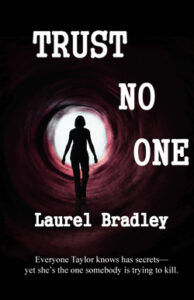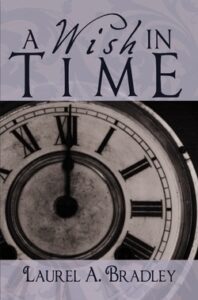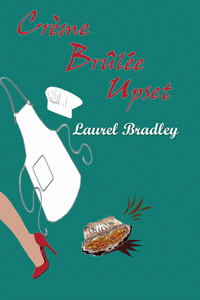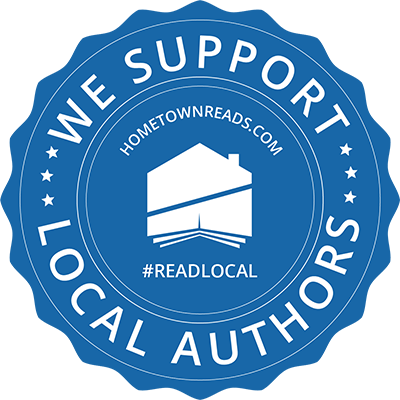Today I’d like to welcome Laurel Bradley! Thank you, Laurel, for being with us!

Laurel Bradley, author of the newly published suspense Trust No One, time travel romance A Wish in Time, and humorous contemporary romance Crème Brûlée Upset, lives in a small town in Wisconsin with her handsome husband and the youngest of their five charming children. The first three kids are now men. The eldest is grown and flown. He’s a rocket scientist, no less. The second is in seminary discerning the Catholic priesthood. The third just graduated from college in three years (yes!) and is getting married to a wonderful young woman at the end of the month. We are thrilled. Number four is the sole girl. She just finished her freshman year of college. So…there’s only the youngest son at home. He’s amazed how much mowing and shoveling there is to do and shocked that his older siblings think he has it made.
WD: What person or event made you interested in writing?
LB: I began creating stories long before I took pen to paper or fingers to keyboard. When I was young, my parents used to read to me at bed time. When they’d had enough or couldn’t read to me, I’d make up stories to tell myself. Putting those words down on paper was the next logical step. I started writing seriously when I was on bed rest with my fifth child.
WD: What method do you prefer writing in: long hand, typewriter, or computer?
LB: I try to imagine what writing was like before the days of computer. My first manuscript, still unpublished, was written long hand while I was on bed rest (there’s no need to sit up to write with a pen). One of my sisters typed it for me. It was after that I decided to ignore the advice of my high school typing teacher and type…er…keyboard my second novel. My instructor would be shocked by how proficient I am on the keys now.
WD: What was your journey like from writing the first pages to getting the book accepted on Trust No One?

The easiest part of writing is…well, writing. The hardest part is finding someone else in the publishing world who likes your book as well as you do. Trust No One had a lot of “almosts” on the road to publication. It was contemplated by a couple of well-known agents and at least one New York firm but eventually rejected.
I became disheartened. In fact, I was fairly certain I wouldn’t ever get published again. I had two published books, I’d just be happy with that.
I demoted writing and publishing from job to hobby—a very healthy move for me as it turned out. I re-evaluated my priorities, putting God first, family second, and everything else third—something I should have done far earlier. I was still writing, but I decided it would be okay if I never published again. I let go of the dream of publishing book three.
Then, out of the blue, I got an email from Brittiany about a new publisher. I ignored the email. Next, a friend and fellow writer forwarded me the same email. I ignored it a second time until she mentioned it while we were in the car. (Thank you, Lorrie.)
I submitted, thinking, “What the heck. What’s another no.” Alan and Goldie Browning of Storyteller Publishing loved it. I hope, if you read it, you’ll feel as they did/do.
WD: Who is your favorite character in Trust No One?
That’s pretty much like asking who of my five children is my favorite. I don’t have one. They are all different and I love them equally, yet differently. I like the nice characters and the creepy ones.
When asked who of her grandchildren was her favorite, my mother said, “Whichever one is with me at that moment.”
I think I’ll borrow that in reference to book characters. Since I love writing because I get to be all the characters, my favorite is whoever I am at the moment. That means that lately, my favorite character has been Dr. Liam Frank from the book I’m polishing. Sorry Taylor, Cochran, Phil, Sean and Accawi.
WD: What was the first scene of Trust No One you had written in your mind?
LB: The house explosion. I saw it go. Saw Taylor and mug… and then I had to figure out what the heck happened.
I have writer friends who plot their books. I admit to being a bit jealous. Part of me would love to know what’s going to happen next. It’s not in me, though. I find out what is happening and why as it happens.
WD: What other books have you written?
A Wish in Time is an award winning time-travel romance that Cheryl Jeffries of Heartstrings Reviews calls, “…a must-read for fans of twisting, turning, wish-fulfilling romances.”

WD: What are your experiences with using a Writer’s Critique Group?
LB: I’ve learned a HUGE amount by being a member of a critique group. One of the things I learned was that in a truly critical critique group, writers need tough skin. I sometimes need to remind myself, it’s the phrasing/or the plot turn/or the lack of character motivation they’re objecting to, not me as a person. They point out things I didn’t think of or didn’t think of in that way. My mantra for Writer’s Group is “better writing is only a rewrite away.”
WD: What was your celebratory dinner when Trust No One was accepted by Storyteller Publishing?
LB: True confession time. I know you’re supposed to celebrate every victory in this industry, but I’m not the jump up and down and squeal type of girl. My first thought upon reading the acceptance email was, “Really? Wow.” Remember I’d given up on publishing. The second was about edits and marketing. “Okay…now the real work begins.”
WD: What advice would you give to new aspiring authors?
LB: You know what they call a writer who doesn’t quit? Published.
WD: Below is a few tips from Laurel for new writers.
— Make certain you have your priorities straight and keep them straight. Writing and marketing can and will devour all your free time if you let it. Publishing is validating, but don’t make it more important than it really is.
— Enjoy the process. Writing is fun. Well…most of the time. Creating worlds and peopling them feeds something in a writer in a way nothing else does. Conferences and writers groups offer great opportunities to talk about writing with other people who understand what we writers find so very attractive about writing.
— Be realistic about your expectations. The latest statistics I’ve seen on the subject state that 93% of all books written don’t sell 1000 copies. Which means that the vast majority of published authors work other jobs out of necessity. The top 3% of authors make enough money to live off, and some of them do very well. The rest of us buy coffee and support our writing habit by financing our conference attendance. (Okay, it’s not that bad, but if people knew how little the average author actually made off her/his books, there wouldn’t be pirating. Or maybe there would. I don’t understand theft, but that’s an issue for another time.) The point is, be realistic. Writing and publishing are fun and satisfying, but don’t expect to be able to quit your day job.
— Join a critique group or find a critique partner. No matter how good a writer you are, you need someone else to point out where you weren’t as clear as you thought you were. It’s best if you set the rules up front so each member know what is expected. It’s easy to burn out a non-writing critique partner, so editing reciprocity is important.
— Join a writer’s group. No one understands writers like writers. We’re fun/creative people who aren’t nearly as crazy as our non-writing friends/family think.
— Have fun with it. Most writers don’t make much money. Therefore, we don’t write for the money. If you aren’t having fun, why are you doing it?– Don’t get discouraged. Most skills are learned. Writing is a skill. Besides, if I can get published after “quitting,” you can get published while actively pursuing your dream. Timing, sometimes, is everything.
— Make certain you say thank you—when someone helps you, when they read your manuscript, when they take the time to offer constructive suggestions, when they buy your book, when they host you on their blog… (Thank You, Brittiany!)
I wrote a version of this a few years ago and updated it for this blog because it still holds true.
Don’t Be a Newbie
Rules to follow to avoid looking like an amateur
As a reader, there has probably been a point in your life when you’ve read a book and thought, “I wish I’d written that,” or perhaps, “I could write better than that.” I read somewhere that 83 percent of Americans dream of writing a book. Chances are you are one of them.
If so, welcome to the club.
I’ve been authoring stories long before I set pen to paper (or fingers to keys). It started with telling myself bedtime stories and progressed through scribbling in a notebook as I watched my kids play to seeing myself become published.
I’ve made a lot of mistakes along the way. There were, and still are, many times I wished I had a list of rules to do and things to avoid doing. After considering my blunders and polling fellow writers, I’ve come up with a list of “do’s” and “don’ts.”
Do:
1. Format correctly.
- One inch margins all the way around. (Go to “page set up” under File to modify margins.).
- 12 point Times New Roman or Courier font.
- Five space indent.
- Double-spaced, single-sided pages are standard.
- One space after a period and an end mark.
- Start new chapters halfway down the page.
- Underline where you’d like the text italicized (internal monologue, titles, etc.) WD: This is important because sometimes during the publisher’s formatting process italics are lost. Underlining helps the publisher know where you need italics.
- Separate scene changes within a chapter with one-line space, using three asterisks separated by spaces * * * if said break occurs at the end of a page. WD: The # sign can also be used.
- Use white paper if the agent/editor wants a hard copy. Most want an electronic Word document.
- End a chapter with a hard return (hit Ctrl and End at the same time). This will start the new chapter on a new page.
2. Make certain the agent or editor handles your genre before querying them.
Read your prospective agent, publisher, or editor’s website. Do they publish/handle what you write? Are they accepting queries? There are a lot of books that list agents, publishers and editors. (Jeff Herman writes a good one.) Read the books published by particular houses. What type of voice do they seem drawn to?
3. Read how an agent or editor wants to be approached and follow the rules.
Agents and editors receive hundreds of queries a day. Again, check with the specific agent/editor’s website or the most recent Writer’s Market or Jeff Herman’s Guide to Book Publishers, Editors, and Literary Agent.
4. Treat writing as a business.
Make your correspondence business correspondence. Queries and cover letters should be typed and formatted as a letter, complete with the return address and the contact information. If you are sending hard copies, make certain they are clean and properly formatted. Treat emailed queries as business letters and format them accordingly.
Note that sliding a manuscript under the bathroom stall at a convention is NOT something a serious business person would do.
5. Proofread.
Better yet, have someone else proofread your work, including your query letter. Sometimes authors are so close to their work, they cannot read what it actually says, and read instead what it is supposed to say.
WD: We offer this service to authors, if they need it. 🙂 Query letters and synopses can be tricky.
6. Know the tools of the trade.
- Take classes and read books on writing so you know what story arc, sub plot, tension, and theme are.
- Buy a manual of style—either Chicago Manual of Style or AP Manual of Style—and refer to it for grammar and punctuation questions. Most publishers that I’ve talked to prefer Chicago Manual of Style but not all.
- Learn the difference between strong writing and weak writing.
7. Develop name recognition—even if you aren’t published.
It is never too early to market yourself as an expert.
- Enter contests.
- Write positive book reviews. Yes, positive. If you don’t like a book, don’t review it.
- Create and maintain a website.
8. Learn about the profession from the professionals.
- Join loops and professional groups.
- Subscribe to and read professional journals (i.e. Publishers Weekly, Writer’s Digest, Romance Writers Review)
WD: Check under Resources on our website for more information on this subject. https://writtendreams.com/Resources.html
9. Write daily.
Even if you aren’t actively working on a book, short story or article, write something. Journaling counts.
10. Ask for help.
As a group, authors are incredibly generous. Everyone started as a beginner. Most authors are more than thrilled to help if they aren’t working under a deadline.
Don’t:
1. Don’t “head hop.”
Head hopping is changing point of view (POV) several times within a single scene. Sometimes head hopping can get so bad that the POV shifts with every paragraph or every line. While some authors are more skillful at it than others, head hopping tends to pull the reader out of the scene. Never a good thing. Naturally, this does not mean an author can’t have more than one point of view in a scene, just that it shouldn’t be done frequently. Keeping a scene in a single point of view strengthens the reader’s connection with the character and the action.
2. Don’t tell every minute of your character’s day or his/her entire life history.
Strong writing means that each scene should have purpose and advance the plot. If it doesn’t advance the plot, it should be eliminated. This goes for chunks of “back story” as well. The “back story” is the events that happen before the book starts.
3. If submitting a hard copy, don’t bind or perfume your manuscript.
Wrapping it as a present and printing a cover are also unnecessary and will mark you as an amateur.
4. Don’t mention how much your mother, father, and Aunt Clara love your work.
5. Don’t discount small presses and e-publishers.
Not so long ago self publishing, electronic publishing and small independent publishers were the ugly stepchildren of the industry. Thankfully, things are changing. There’s money to be made in the smaller niche markets and most readers don’t care who published a book as long as the story is compelling, the writing is strong, the editing is clean, and they are able to get the book in the format they want.
6. Don’t write bad reviews or bad-mouth agents, editors, publishing houses, or other authors on the loops. What goes around comes around.
7. Don’t send a manuscript before it is ready.
Really—wait until it is polished before querying.
8. Don’t expect agents and publishing house editors to be your therapist or friend.
They are nice people, but their job is to sell books not counsel on personal matters. Giving career advice is a different story. That IS part of their job.
9. Don’t expect someone else to market your book for you.
Authors wear a lot of hats, and marketing/publicity agent is one of them. If you are fortunate, your publisher may allocate a limited marketing budget for your book, but don’t count on it. Count on working to promote your own book. It has been said before by others—writing is the easy part.
10. Don’t give up.
Dreams do come true. Sometimes you have to make them; other times they fall into your lap. Either way, make certain you have your priorities in order. This business will eat you alive if you let it. Don’t.
WD: Thanks so much, Laurel, for the great tips! If you have any questions for Laurel or advice to add, please post a comment on our blog. Laurel will be checking in today to answer any questions. You can also email Laurel directly at laurel@laurelbradley.com. She would love to hear from you and add your words of wisdom to the list. Visit her website at http://www.laurelbradley.com/




Nice interview:) My question is this: I am in the process of revising/editing(with help) my middle grade fantasy novel. I was recently published for the first time in an anthology. I’m thinking of pursuing getting short stories published as a way to get my name out there and to perfect my writing. Is this a good idea to do as I am still polishing my novel, or should I wait until revisions are done so I can focus on the novel?
Short story writing is always a great way to help learn the writing curve faster. One of my mentors suggested a story a week for a year.
As to your question, it’s really a matter of how you work. If you need a break from revisions, writing a short story is a fun option. 🙂
Joanie,
I used to always have more than one thing going at a time because that’s how my brain works. However, I discovered it really slowed down progress on each story. I felt as if I wasn’t getting anything accomplished. Moving forward, yes, but not finishing anything.
Assigning specific goals to each project helps, (ie edit 20 pages of the fantasy, write 10 pages on the short) but sometimes I need to focus on one project to finish it especially if I’m at a hard spot. Interestingly enough, it’s when I’m in a hard spot that I’m more apt to want to work on something else for a while. That can be productive (allowing your brain to work out the problem while you’re focusing on something else) or an avoidance technique. Check your motivation and your goals, then proceed accordingly.
As long as you aren’t writing short stories because the fantasy is too hard to do right now, I’d say take a specific amount of time and try writing short. It is a great way to get your name out there, especially if you offer your shorts as “free reads.”
By the way, writing short is hard but it teaches great skills in plotting, characterization, and story arc. Whatever you do, make certain you edit your work before publishing it.
Thank you for the question.
Laurel
Interesting, because every editor/agent I’ve worked with in the last 5 years has said underlining for italics is obsolete, and I’ve always used bold, italics, etc., in my manuscripts. Of course, it’s been years since anyone has ever asked for a hard copy. It’s all digital. Also, they want indents in paragraph/ruler format. Half inch is standard. No tabs, no spaces.
However, the BEST rule to follow is whatever the submission guidelines for that agent/editor request, even if you have to create several versions. Thank goodness, with word processing, it’s a quick step.
Terry
Terry’s Place
Great point, Terry! Following the guidelines for that specific publisher a manuscript is being submitted to is the best route. Thanks for your comment! 🙂
Terry,
You are right, it’s all up to the editor. The ones I’ve worked with liked how easy the underlining was to spot and change to how they like.
It is always best to listen to your editor and follow what they suggest. Word processing has changed everything, making it a breeze to put things in the form suggested by a publisher’s website.
Thank you for your comment.
Like Joanie said, very nice interview. If you could do one thing differently with your writing and road to first-published book, what would it be?
Thank you, Lorrie.
If I had it all to do over again I’d have done two things differently. 1.Taken the leap into publishing earlier. Self publishing isn’t what it was just a few years ago. Readers don’t generally care who published the book as long as they can get it in the format they want.
2. I’d have gotten my priorities in order earlier. A lot of things happen during writing, publication and promotion that an author doesn’t have control over. Making certain writing/publishing holds its correct place in your personal scheme of things, makes the less than ideal things that happen easier to handle.
Laurel,
Excellent job and some very valid points made and emphasized in a manner that won’t totally discouraged new writers or even those of us who’ve been at it for ages.
I agree totally about writing something everyday. That keeps a writer in what I call writerly mode. It’s easier to get into the writing mode if your do it regularly–sort of like thinking about lunch when you glance at the clock and see it’s close to noon.
Great tip, Mary Jo! I love the analogy about lunch! 🙂
Mary Jo,
I loved your analogy about lunch.
Thanks for stopping by.
Laurel
Thank you for all the wonderful questions and comments!
A huge thank you to Laurel for taking time out of her day to be with us today! Thank you so much, Laurel! Best of luck with all your future endeavors, and the release of Trust No One.
Thank you for having me, Brittiany. I had a great time.